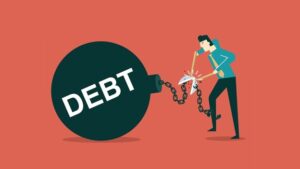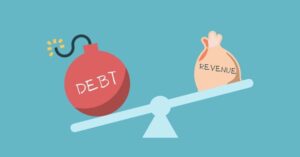Debt can be difficult to discuss, especially with all those close to you. Numerous individuals are struggling with debt and don’t have anyone to talk to about it. This can end up making debt even more difficult to bear.
We advise you to be as forthcoming and truthful about your financial condition with your loved ones as you can. However, discussing debt can occasionally cause friction in a relationship. Especially if you haven’t previously discussed your debt with your loved ones, your partner, or your kids.
Obtaining debt guidance is simply one aspect of the problem. Support can make a huge impact on your day-to-day existence. Here are some actions you can take to ease your condition, no matter what it is.
Find someone you can trust
The advantages of talking to someone about your debts are numerous. It’s probable that someone close to you is also struggling with debt. Everyone can benefit from talking about debt, and it can help you feel less alone.

Telling them about your debt
If you’re in a committed relationship, especially if you’re married, cohabitating, or considering it, you should inform your spouse as soon as possible about your debt. Admitting to your partner that you’ve been having problems can be challenging. But if you’re under pressure, it’s probable that they already sense something is amiss.
Borrowing conversations can elicit a wide range of unfavourable emotions. However, keeping it a secret from your spouse could make things more difficult for you. Arguments, a lack of interaction, and mental health problems like anxiety or depression can all result from stress in your life.
If you share a joint bank account with your partner, any missed or lowered payments you make toward both these debts will affect your credit file. These reduced pay-outs may be evidenced on their credit file if they apply for a card or other financial instrument in the future. Guarantee them that you are working on the problem. Inform them that you are seeking assistance from a free and private debt advice organization.
Inform them that you are making headway. If you’re on a debt solution, you’re getting closer to your objective of debt repayment. Any lowered payment you make will be recorded on your credit report. This implies that your credit report is gradually being repaired. Inform your partner of this. It is critical that they understand that the problems you are experiencing will not last forever.
The lesson of your life
If your debt is causing you to worry, it’s possible that other circumstances in your life are making matters worse. You might feel less stressed if you ask others in your immediate vicinity for assistance. Spending as much time as you can with your loved ones is also crucial.
Take the time to exercise, get plenty of rest, and eat a healthy diet. There are several activities you may engage in to be active without spending any money. It’s crucial to focus on your general health and well-being.
Set aside time for your partner and you. When the weather is pleasant, go for walks, pick up a free pastime or choose a movie to watch; and debate it as a couple. Your relationship can be reinforced, which can make you both feel supported and understood.
There are organizations that can assist you in improving your communication with your partner if you struggle to talk to them. You can speak with your Human resources department in confidence if you are employed. Your company might be able to provide you with support options if they are aware of what you’re going through.
- Your debt repayment percentage
You will be able to pay off your debts far more rapidly if you allocate at least 15% of your salary, Social Security, or pension income to debt repayment. Because most credit or debit card providers simply expect you to pay 2% of the total due each month. Making only minimum payments results in interest being added to your debt balances each month or year. You may save a lot of money just on interest payments by paying off sizable portions of your debt in a short period of time.
2. Use your savings to pay larger debts
Do not be reluctant to utilize some of your money to settle high-interest obligations. You will stop collecting interest on those substantial balances if you use cash reserves to pay down debt. Despite the fact that having a little extra money in your bank account may feel comforting, given the historically low-interest rates in effect right now, those funds aren’t really benefiting you. Don’t spend all of your savings. Use some of the money you have on hand to pay down your debt if you have a lot of money.

3. Use a tax refund check to pay the debt
While it may be tempting to spend those tax refund checks on a luxury item or a trip, however, it would be a wiser financial decision to pay off part, or all, of your debt. Think about the benefits of using a single-payment debt payoff approach to lower your monthly payments. Instead of taking pleasure in the momentary delight of purchase, you will benefit from a smaller debt load throughout the entire year and also for years to come.
4. Sell items
Make a list of the things you could offer for sale at a garage sale, on Craigslist, or on eBay. Generating some additional income by reselling things you no longer require or are willing to part with. You can quickly reduce your debt by using the money to pay off debt.
5. Your life insurance
Going to cash in your life insurance policy may be a viable debt repayment strategy because it allows you to pay off larger amounts of debt more quickly. If you are overwhelmed by debt and do not have beneficiaries who should take advantage of your life insurance coverage.

6. Make money
If you’re really committed to paying off that debt in a year, you should seek ways to boost your income and utilize the extra cash to pay off debt as rapidly as you can. Make paying off debt a top priority and consider ways to start making extra cash for at least a few months, whether it be by taking on part-time work or asking for a raise from your employer.
7. Credit card balance
A balance transfer may help if you want to really ramp up your debt relief efforts. You can completely erase credit card interest by converting large debt to a deal with a zero percent interest rate that lasts for about a year. This improves cash flow, allowing you to have more money to pay off those credit card payments. Please be sure you are obtaining that low rate before signing up by reading the fine print.
8. Use the law to eliminate old debt
Some people have paid off very old credit card bills even though they are no longer legally required to. The rules regulating unpaid debts vary from state to state. Some states limit the amount of time a creditor has to sue you for an old debt, while others prohibit debt collectors from collecting particular types of debt after a given amount of time. In any case, you should check to see if the statute of limitations runs on any potential past debts you may have. If it has, you can probably skip the repayment without fear of negative effects on your finances, legal situation, or credit.




GIPHY App Key not set. Please check settings